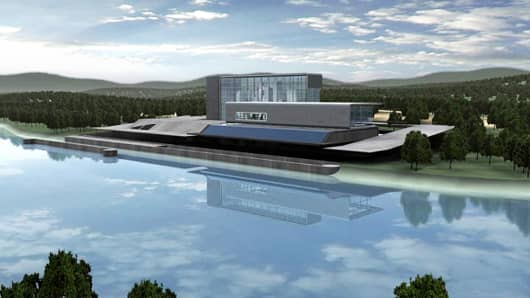"Game over," she said.
Within minutes, someone changed the sign on the marquis outside the building to "FUTUREGEN, WE GOT IT."
Gov. Rod Blagojevich, who arrived in Mattoon later, said the town was chosen for the right reasons, including because it's in a coal-producing state.
"I know this is the biggest economic development opportunity for east-central Illinois in decades, so Merry Christmas Mattoon," Blagojevich said.
Griffin said representatives from the industry group, known as FutureGen Alliance, were to be in Mattoon Wednesday to begin seismic surveys of 16 square miles of land. The alliance comprises 12 U.S. and foreign energy companies _ including major U.S. coal-burning utilities American Electric Power and Southern Co., and the country's largest coal producer, Peabody Energy _ that have committed $400 million to the project over 10 years.
Center Of Attention
President Bush has touted FutureGen as key to developing carbon-free coal-burning power plants. It is supposed to be virtually pollution-free and produce both electricity and hydrogen _ while its carbon dioxide, a leading greenhouse gas, is to be captured and stored deep underground.
Environmental groups will closely watch the plant. For now, the Sierra Club welcomes the testing of the technology, said Bruce Nilles of the group's Midwest Clean Energy Campaign. For the coal industry, besieged by questions about its role in global warming, "this is sort of their last stand. This is it," Nilles said.
"We welcome an honest discussion about is it technically and financial feasible for coal to be burned in a responsible manner," he said. "Obviously, this is being heralded as, does coal have a future? And this is a very important research project."
But the project, three-fourths of which is taxpayer-funded, has been under increasing scrutiny in Congress. Some lawmakers have questioned its soaring cost _ nearly double the $950 million originally projected _ and its long delays.
Congress is giving the program $75 million this year, $33 million less than the administration had wanted.
Blagojevich said he and his staff will continue to lobby Congress to keep the process moving.
Texas officials also congratulated Illinois.
"Naturally we are disappointed that the FutureGen Alliance ultimately chose a project site in Illinois, but we congratulate our friends in Illinois and offer our full support for the project," Texas Railroad Commission Chairman Michael L. Williams, who chairs the FutureGen Texas team, said in a statement.
Williams said he will begin working to "make FutureGen-like projects a reality in Texas."
Tuscola officials said the process helped spotlight the region's economic-development potential.
"I'm not going to be too shook up about the fact that I've got a $2 billion project going in 20 miles down the road," said Brian Moody, Tuscola's economic development chief. "Obviously we've got a little disappointment here in not being the host, sure. But we sure have a lot to be proud of, and it's a tremendous victory for Illinois."
"We're going to do something to put Illinois in the center of the world in clean-coal technology," said Jack Lavin, director of the Illinois Department of Commerce and Economic Opportunity. "The world will be watching us, the world will be visiting us."
The project, with hundreds of jobs and prestige at stake, has been the subject of intense lobbying by lawmakers from the two competing states.
Illinois offered a $17 million grant to help pay for various project costs, as well as an estimated $15 million in sales tax exemptions on materials and equipment through local enterprise zones. The state also has set aside $50 million for below-market rate loans to the FutureGen alliance.



